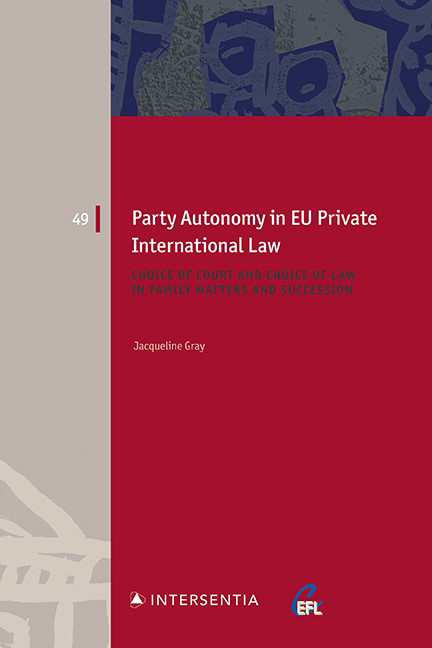 Party Autonomy in EU Private International Law
Party Autonomy in EU Private International Law Published online by Cambridge University Press: 25 May 2021
INTRODUCTION
The previous chapter addressed the intrinsic value of free will within the present context of party autonomy in the EU private international law relating to family matters and succession. It was established that although free will holds value as the guiding force that drives party autonomy, for the present purposes the concept is essentially restricted by the legal system and context in which it is set.
There are other justifications that have been proposed for the usage of party autonomy in private international law besides that which focuses on its inherent value; for instance those based upon the beneficial impact of party autonomy to the parties themselves, as well as wider society. However, this examination specifically focuses upon the underpinnings of this principle in relation to its status as a unified measure of EU law. In order to do this, the specific goals behind the EU‘s unification of private international law rules on family matters and succession must be presented.
This chapter begins by presenting the context in which such unification is embedded by illustrating the ideological and legal changes that have taken place over the past 25 years in order to accommodate private international law measures on family matters and succession (3.2.). Leading on from this, the aims of party autonomy in its role as an EU measure that purports to facilitate the free movement of persons will be considered by setting out the potential obstacles that people face in cross-border family matters and succession, namely legal uncertainty (3.3.), a lack of affinity with the applicable law (3.4.), and practical hindrances to accessing justice (3.5.) Along with the exercise of free will as defined in the previous chapter, these identified obstacles will make up the elements through which the evaluation carried out in this book will be conducted.
THE EUROPEANISATION OF PRIVATE INTERNATIONAL LAW ON FAMILY MATTERS AND SUCCESSION
To set the scene for considering the objectives of EU action to introduce unified measures for private international law in family matters and succession, the manner in which the Union came to be involved in this field must first be considered.
To save this book to your Kindle, first ensure [email protected] is added to your Approved Personal Document E-mail List under your Personal Document Settings on the Manage Your Content and Devices page of your Amazon account. Then enter the ‘name’ part of your Kindle email address below. Find out more about saving to your Kindle.
Note you can select to save to either the @free.kindle.com or @kindle.com variations. ‘@free.kindle.com’ emails are free but can only be saved to your device when it is connected to wi-fi. ‘@kindle.com’ emails can be delivered even when you are not connected to wi-fi, but note that service fees apply.
Find out more about the Kindle Personal Document Service.
To save content items to your account, please confirm that you agree to abide by our usage policies. If this is the first time you use this feature, you will be asked to authorise Cambridge Core to connect with your account. Find out more about saving content to Dropbox.
To save content items to your account, please confirm that you agree to abide by our usage policies. If this is the first time you use this feature, you will be asked to authorise Cambridge Core to connect with your account. Find out more about saving content to Google Drive.